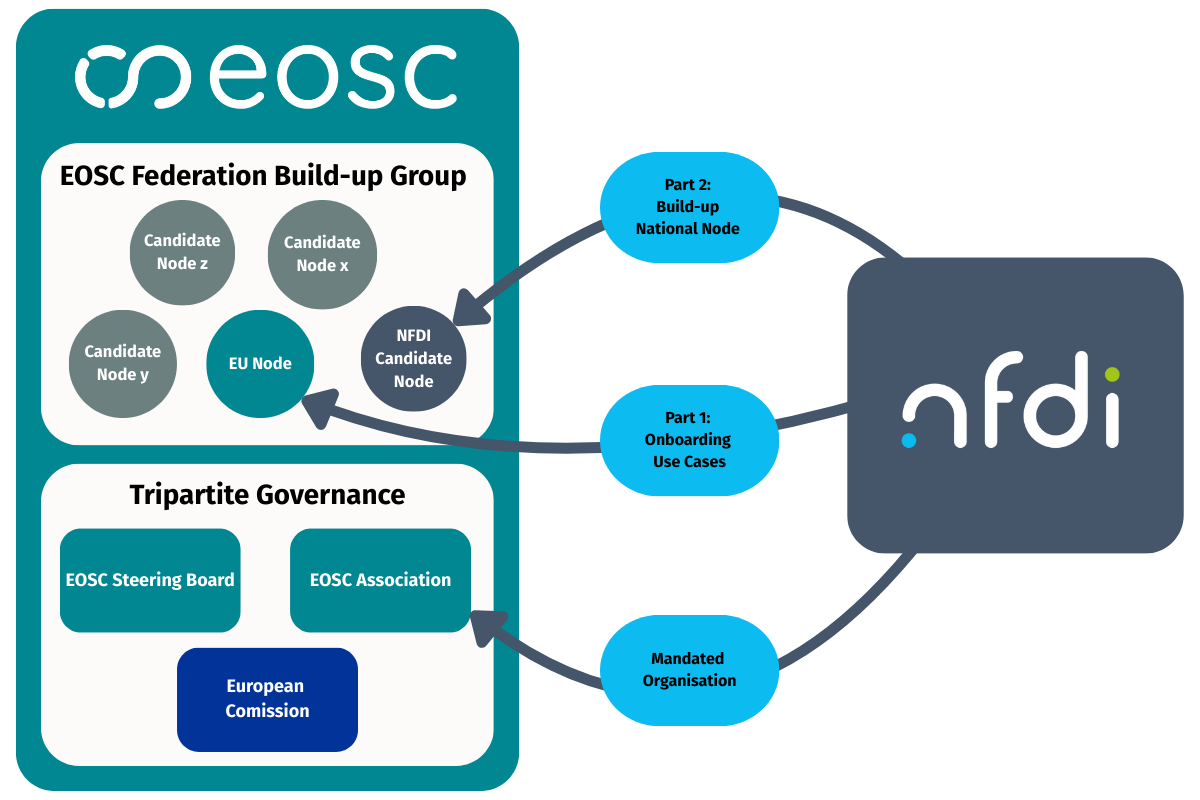
The EOSC Node Germany is being developed as a central institution to enable the connection of the infrastructures, data, and services of NFDI and, in the future, other national actors to the European EOSC network. The aim is to create an interface that facilitates exchange and integration between national and European research infrastructures.
Essentially, the node supports the integration of NFDI’s subject- and area-specific services through targeted socio-technical measures, thereby promoting cooperation between the participating communities. In addition, a technical layer is being established that provides the necessary functions and capabilities as described in the EOSC Federation Handbook.
EOSC Node Germany is one of the candidates selected for the expansion of the European network. This is based on the guidelines and minimum requirements for operation and interoperability described in the Federation Handbook. Depending on its technical design, a node can either access the central EOSC EU node or operate independently as a fully functional operational unit.
EOSC Node Germany is currently in the development phase.
Phases of Node Setup
Schalter (ausgeblendet)
First Phase
The development of the EOSC Node Germany is in its first phase, which will run until its presentation at the EOSC Symposium in November 2025, and aims to integrate a range of services into the EOSC system by onboarding them to the EOSC EU node. The number of services has been deliberately kept low in the first phase, as the focus is on gathering experience, both on the provider side and on the supporter side.
Second Phase
Parallel to the first phase, NFDI is currently planning the second phase. The second phase relates to the development of the national NFDI node. In order to tackle the establishment of a node, the members of the NFDI association and its committees are working on a common understanding of the node and its requirements, and are clarifying issues that may be relevant to the establishment and operation of the node. The integration of the German national EOSC node will begin in 2026.
Use Cases
- InvenioRDM: Integration of Invenio-based management systems for repositories into the EOSC Federation using the meta-knowledge graph of the EOSC EU Node. Provision of an interface to support the onboarding of InvenioRDM instances with the EU Node. Starting point: BERD data portal.
- Galaxy Server: Demonstration of reuse of tools and workflows in different scientific domains. Combination of analysis tools with different datasets using European/EOSC computing and storage resources.
- Photon and Neutron (Meta)Database: Provision of an input mask and database for curated photon and neutron metadata as well as a reference to stored data, e.g. at Zenodo. Collaboration with PaNOSC.
NFDI & EOSC – Collaboration for a connected research landscape
The cooperation between the German National Research Data Infrastructure (NFDI) and the European Open Science Cloud (EOSC) strengthens the European Research Area. Joint strategies, open data standards, and coordinated services create sustainable structures that facilitate access to research data, promote innovation, and improve scientific collaboration across disciplines and countries.
Activities of NFDI in EOSC
NFDI plays a dual role in EOSC. The association is the mandated organization in the EOSC Association for Germany. NFDI has also been selected as a candidate node along with 12 other applicants and is thus involved in setting up the EOSC Federation. The candidate nodes are working together in a build-up group on the first phase of establishing the EOSC Federation.

ausgeblendet
x
Impulses for the NFDI community
The collaboration between NFDI and EOSC creates significant added value for the scientific community in Germany and Europe. Close coordination and cooperation avoid redundancies and reduce parallel developments of similar services or tools. At the same time, integration into the European research landscape promotes broader use of NFDI services and the reuse of research data, software, and results.
EOSC provides a framework for aligning national infrastructures with European standards, thereby increasing interoperability and efficiency. This particularly supports member states and institutions with less mature research infrastructures. In addition, the orientation towards FAIR principles contributes to better data management, greater transparency, and easier reuse of research results.
Impulses for the EOSC community
The EOSC community also benefits from close cooperation with the NFDI. Access to high-quality, curated research data and services from various disciplines facilitates scientific work and promotes innovation. Researchers are given the opportunity to collaborate across borders, exchange knowledge, and build on existing results. This breaks down data silos, improves the reproducibility of scientific work, and strengthens interdisciplinary research.
Together, the NFDI and EOSC are helping to advance open science in Europe: transparent, networked, and sustainable.
Background information on EOSC
Schalter (ausgeblendet)
Open Science als Grundlage für EOSC
The vision of EOSC is to establish a system in Europe that enables the discovery and access of data and services for research and innovation. This should help researchers to store, share, process, analyze, and reuse FAIR research data, both within disciplines and across disciplines.
Structure of EOSC
EOSC builds on existing infrastructures and services supported by the European Commission, Member States, and research communities (tripartite). It brings these together in a federal “system of systems” and creates added value by bringing together content and sharing services.
This environment will operate under precisely defined conditions to ensure trust and protect the public interest. The expectations of service providers and users will be clearly formulated.
The objective of EOSC
The aim of the European Open Science Cloud, or EOSC for short, is to develop a “Web of FAIR Data and Services” for science in Europe. The implementation of EOSC is based on a long-term process of adaptation and coordination that the Commission has been pursuing since 2015.
EOSC EU Node
The EU Node is the first node in the EOSC Federation of Nodes and has been offering researchers new data management services since 2024, such as bulk data transfer, virtual machines, and interactive notebooks. The range of services is being continuously expanded.
